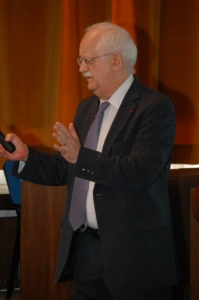Distinguished iNANO Lecture: Alzheimer Disease and Oxidative Stress: Thou Shalt not Breathe nor Think !
Christian Amatore, Head of Research, Ecole Normale Supérieure, UPMC & CNRS, Paris, France
Info about event
Time
Location
iNANO AUD (1593-012), Gustav Wieds Vej 14, 8000 Aarhus C

Christian Amatore, Ecole Normale Supérieure, UPMC & CNRS, Paris, France
Alzheimer Disease and Oxidative Stress: Thou Shalt not Breathe nor Think !
Oxidative stress is an essential metabolic outcome in aerobic organisms due to the activity of mitochondria in providing the basic energy of cells or during the operation of several enzymatic pools (NADH-oxidases, NADPH-oxidases, NO-synthases, etc.) in recycling or producing important molecules. It also serves to regulate the size and shape of organs or restructure them during foetal development by apoptosis. The same occurs in organs (e.g., liver, bones) at the adult stage to control cell populations. Oxidative stress is also indispensable to the immune system by allowing macrophages to eliminate virus, bacteria and impaired or dead cells through phagocytosis. In fact, no aerobic organism could live without oxidative stress.
Albeit these numerous benefits of oxidative stress explain why evolution maintain these essential mechanisms in aerobic organisms, they are associated to highly negative issues. Indeed, oxidative stress mechanisms provide a variety of life-harmful radicals and species called generically Reactive Oxygen Species (ROS) and Reactive Nitrogen Species (RNS) whose fluxes need to be finely controlled to avoid the destruction of most organic molecules (e.g., lipids in cell membranes, enzymes, etc.) and biological ones (DNA, proteins, etc.) in cells. Thus, under normal conditions, a panoply of dedicated antioxidants and specific enzymatic systems (e.g., superoxide dismutase, catalase, etc.) is present in cells and ensures a fine homeostatic balance. However, rupture of this delicate balance is frequent and may provoke severe damages in cells and tissues that are important causative factors in many human pathologies (aging, cancers, AIDS, hearth and brain strokes, Parkinson and Alzheimer’ diseases, etc.) when their rates of occurrence exceed the capabilities of repairing systems.

Host: Professor Kim Daasbjerg, iNANO & Dept. of Chemistry, Aarhus University
Coffee, tea and bread will be served from 10:00 am in front of the iNANO auditorium